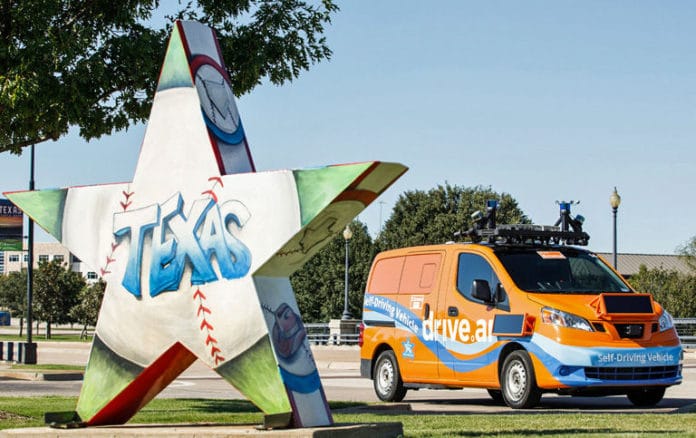Want to catch a Drive.ai in Arlington? It’s free for the moment. Here’s a link:
https://bit.ly/2uDYOZ1
The results of what is still a pilot program – it’s called Drive.ie — have been encouraging, enough so that the city expanded the fleet from three to seven vehicles starting April 1.
If, somewhere in the not-distant future, autonomous vehicles should become the everyday norm in Texas – the operant word is really more “when” than “if” – Arlington should receive credit as the Lone Star State trend kick-starter.
The city became the first in Texas to offer on-street autonomous vehicles last October, albeit in a careful, less-than-grandiose way: What residents and visitors saw were three gadget-laden blue and orange vehicles puttering slowly and cautiously along prescribed routes in the Entertainment District (Cowboys, Rangers, nearby hotels), each with a sort of conductor on board to provide enlightenment and perhaps relieve anxieties.
The answer to “Who’s driving this thing?” was, after all, “Nobody.”
The tally so far: Accidents, zero. Equipment failures, zero. Trips completed, 100 percent.
The sample size continues to expand. More than 1,000 people tried the vehicles, signing up for rides either through kiosks in the Entertainment District or, as seems to be the way of the world, through an app on their smart phones.
The results of what is still a pilot program – it’s called Drive.ai — have been encouraging, enough so that the city expanded the fleet from three to seven vehicles starting April 1.
More significantly, ambitions have grown for the pilot program. Plans are in the works to expand the route to downtown and the University of Texas at Arlington. When that happens – if it happens — it’ll mean the autonomous-vehicle routes will expand from a few blocks to almost two miles in the most highly trafficked areas of the city. And that test of the technology, of course, will also be an event that will come under intense scrutiny from hundreds of Texas cities and counties.
If the program were to be eventually adopted and expanded, it would mean that people within that area would a) not need a car and b) could visit multiple destinations, including homes, restaurants, bars, retail, the library, churches, City Hall, UT Arlington classes or events, yoga sessions and likely many activities that will be added to this list. In short, it would mean a work/live/play, potentially auto-free environment that would also be easily accessible to visitors and the dollars they bring with them.
There’s another critical assumption: that access to transportation will positively affect economic development in proximity, much as a streetcar route affects development in a Boston or as an interstate highway has impact in an Arlington.
That won’t happen with a pilot program of only seven autonomous vehicles, but every flood of change begins with just a trickle.
We should pause right here to note that an ongoing ambition of the powers-that-be in Arlington has been to provide closer links to a growing UT Arlington, which now has more than 50,000 on-campus students, a resurging downtown and the 15-million plus people who visit the Entertainment District.
No one knows how the costs versus benefits of Drive.ie will evolve, which is why it’s a pilot program. Or if residents will accept it as anything more than a novelty.
One of the people most interested in how it all plays out is Downtown Arlington Management Corp.’s new president, Maggie Campbell.
“A big part of the pilot program is trying to understand what the concerns of potential users are,” she said. “It’s a total education process to determine what people are afraid of or what they don’t know. It’s a mix of uncertainty, fear and curiosity, and not everybody is going to be an adopter. Programs like Drive.ai are what make it possible to work around some of those challenges.”
Campbell endorses the proactive strategy the city has taken with autonomous vehicles, particularly the use of a pilot program to study the issue.
“I think with a pilot program you’re giving yourself permission to either succeed or fail. If it doesn’t work, move on and try something else.”
That said, Campbell also predicts that not only will autonomous vehicles become commonplace, but their increasing popularity will rapidly redefine traditional land uses in urban environments.
“All the ways we think about cars, places to park cars, and city land uses are going to be turned on their head,” she predicts.
O.K. Carter is a former editor and publisher of the Arlington Citizen-Journal and was also Arlington publisher and columnist for the Star-Telegram and founding editor of Arlington Today Magazine. He’s the author of the definitive book on Arlington’s colorful history, Caddos, Cotton and Cowboys: Essays on Arlington.
okcarter@bizpress.net








